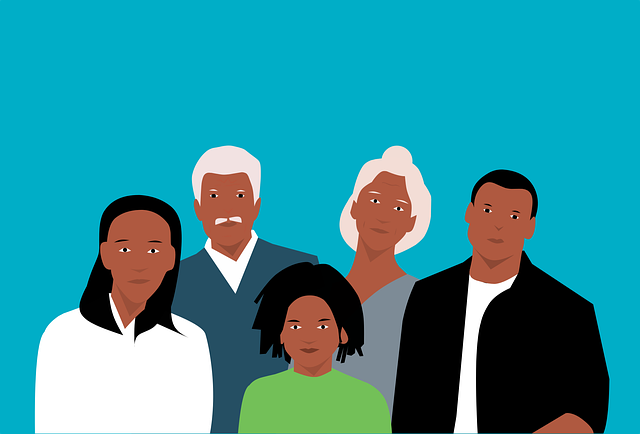Family support resources like parenting groups and caregiving workshops, coupled with mental health services, are pivotal in building strong, intergenerational family networks. These initiatives foster emotional well-being, strengthen bonds across age groups, and create tailored supportive environments. Community centers play a central role by providing platforms for knowledge exchange, open dialogue, and mutual understanding, ultimately enhancing resilience within families and communities. By leveraging these resources, families can navigate challenges together, fortifying their ties in an ever-changing world.
In today’s fast-paced world, intergenerational bonding within support networks is more crucial than ever. This article explores strategies to strengthen family connections and foster a vibrant community for families. We delve into leveraging family support resources, from identifying available services to the role of community centers. Additionally, we discuss building strong family networks through collaborative efforts, emotional support systems, and the benefits of caregiving help groups and parenting support communities. Ultimately, by integrating these practices, families can create supportive environments that enhance mental health and strengthen ties across generations.
Leveraging Family Support Resources for Intergenerational Bonding
Family support resources play a pivotal role in fostering intergenerational bonding and strengthening family networks. Building strong family ties is essential for emotional well-being, especially within diverse communities where families often face unique challenges. Parenting support groups, for instance, offer a platform for parents from different generations to connect, share experiences, and learn from one another. These groups not only provide practical advice but also create a sense of belonging, fostering deeper relationships across age groups.
Creating supportive environments within these communities is crucial. This can be achieved through organized activities that encourage intergenerational interactions, such as family caregiving help sessions or community events designed to bring families together. Mental health support for families is another key aspect; providing resources for managing stress and promoting open communication helps strengthen the emotional support systems within these networks. By leveraging these family support resources, communities can ensure that each generation feels valued and supported, leading to a more cohesive and resilient society.
– Identifying and utilizing available resources
Identifying and utilizing available resources is a key step in fostering strong intergenerational bonds within support networks. Family support resources, such as parenting support groups and community for families, play a crucial role in building family networks. These platforms offer a sense of belonging and provide opportunities for sharing experiences, offering emotional support systems, and gaining valuable insights from both younger and older generations. By actively engaging with these resources, families can strengthen their ties and create supportive environments that cater to the diverse needs of each member.
Additionally, mental health support for families is an often-overlooked yet essential aspect. Many communities offer specialized services designed to help families navigate challenging situations together. These initiatives not only enhance overall well-being but also encourage open communication and mutual understanding among family members from different age groups. Through such efforts, families can better care for one another, ensuring that each generation receives the necessary assistance and nurturing within a supportive framework.
– The role of community centers and family service organizations
Community centers and family service organizations play a pivotal role in fostering intergenerational bonding within support networks. These spaces serve as hubs for families to connect, share experiences, and build meaningful relationships across different age groups. Through various programs like parenting support groups, caregiving workshops, and mental health sessions, these organizations provide essential family support resources that strengthen emotional support systems. By creating a community for families, they encourage open dialogue, empathy, and mutual understanding, ultimately helping to navigate the complexities of modern family life.
Moreover, community centers facilitate the exchange of practical knowledge and skills among family members. Whether it’s grandparents sharing wisdom with younger generations or parents seeking caregiving help, these organizations enable the transfer of invaluable resources. By strengthening family ties through shared experiences and collaborative learning, they contribute to a more resilient and supportive family network. In today’s fast-paced world, where family dynamics are constantly evolving, such community initiatives play a crucial role in ensuring that emotional bonds remain strong and families thrive.
Building Strong Family Networks through Collaborative Efforts
Strong family networks are built through collaborative efforts that foster emotional support systems and create a community for families. When family members come together to share resources, knowledge, and experiences, they strengthen the ties that bind them. Parenting support groups, for instance, provide a platform for parents to connect, exchange advice, and offer mental health support for one another. This collective approach not only helps in times of need but also enhances overall well-being by nurturing strong family bonds.
Collaborative initiatives can extend beyond immediate families, encompassing extended relatives and friends who contribute to family caregiving help. By involving everyone in the community, these networks ensure a robust system of support that addresses various needs. Creating supportive environments where open communication is encouraged and vulnerabilities are acknowledged strengthens family ties, making them resilient in the face of challenges.
Encouraging intergenerational bonding within support networks strengthens the fabric of communities, fostering a sense of belonging and mutual understanding. By leveraging family support resources, such as community centers and family service organizations, we can create vibrant environments that connect generations. Building strong family networks through collaborative efforts, including parenting support groups and mental health support for families, enhances emotional support systems. Ultimately, these initiatives not only strengthen family ties but also enrich the lives of all involved, creating a supportive ecosystem that benefits both younger and older members of our communities.
